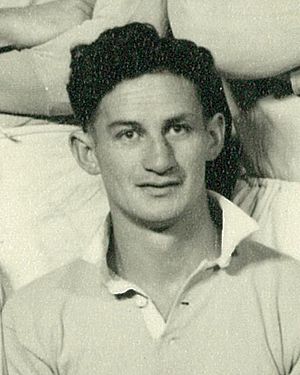Hiwi Tauroa facts for kids
Quick facts for kids
Hiwi Tauroa
|
|||||||||||||||||||||||||||||||||||||
|---|---|---|---|---|---|---|---|---|---|---|---|---|---|---|---|---|---|---|---|---|---|---|---|---|---|---|---|---|---|---|---|---|---|---|---|---|---|

Tauroa in 1950
|
|||||||||||||||||||||||||||||||||||||
| 3rd Race Relations Conciliator | |||||||||||||||||||||||||||||||||||||
| In office 1980–1986 |
|||||||||||||||||||||||||||||||||||||
| Preceded by | Harry Dansey | ||||||||||||||||||||||||||||||||||||
| Succeeded by | Wally Hirsch | ||||||||||||||||||||||||||||||||||||
| Personal details | |||||||||||||||||||||||||||||||||||||
| Born |
Edward Te Rangihiwinui Tauroa
29 May 1927 Okaiawa, Taranaki, New Zealand |
||||||||||||||||||||||||||||||||||||
| Died | 11 December 2018 (aged 91) Whangaroa, New Zealand |
||||||||||||||||||||||||||||||||||||
| Spouse |
Patricia Jane Wilson
(m. 1958) |
||||||||||||||||||||||||||||||||||||
| Children | 6 | ||||||||||||||||||||||||||||||||||||
| Education | Wesley College Hawera Technical High School |
||||||||||||||||||||||||||||||||||||
| Alma mater | Massey Agricultural College Auckland University College |
||||||||||||||||||||||||||||||||||||
| Occupation | Schoolteacher | ||||||||||||||||||||||||||||||||||||
|
Rugby career
|
|||||||||||||||||||||||||||||||||||||
| Rugby union career | |||||||||||||||||||||||||||||||||||||
|
|||||||||||||||||||||||||||||||||||||
Edward Te Rangihiwinui Tauroa (29 May 1927 – 11 December 2018), known as Hiwi Tauroa, was an important New Zealander. He was a talented rugby union player and coach. He also worked as a school principal and a civil servant. Hiwi Tauroa was of Māori descent, from the Ngāpuhi iwi.
Contents
Early Life and Education
Hiwi Tauroa was born in 1927 in a place called Okaiawa, near Hāwera in Taranaki. His father was a Methodist minister, so his family moved around often. Hiwi started school in Waima in the Hokianga.
He later attended Hawera Technical High School. There, he won a scholarship to study at university. He went on to study at both Auckland University College and Massey Agricultural College.
A Career in Teaching
Hiwi Tauroa graduated from university in 1952 with a degree in Agricultural Science. He then began studying for a Diploma in Education. After finishing his studies, he started teaching at various schools across the North Island.
In 1968, Hiwi became the principal of Wesley College. Later, in 1974, he became the principal of Tuakau College. He held this job until 1979. Hiwi Tauroa was the very first Māori person to be appointed as the head of a secondary school in New Zealand. This was a significant achievement!
Rugby Star
Before his teaching career, Hiwi Tauroa was well-known for his rugby skills. He played for the Māori All Blacks from 1951 to 1954. In 1951, while at Massey Agricultural College, he toured Australia with the New Zealand Universities Team. Their tour was very successful, winning many games.
Hiwi kept his passion for rugby even after he stopped playing. In the 1970s, he became a coach for the Counties Rugby Union. In 1979, he led the team to win the National Provincial Championship title.
Public Service and Leadership
In 1979, Hiwi Tauroa took on a very important role. He was appointed New Zealand's Race Relations Conciliator. In this job, he worked to improve understanding between different cultures. He encouraged Pākehā (New Zealanders of European descent) to learn about traditional Māori customs and culture. He started courses for businesses to help them adopt a more multicultural mindset.
During his time as Conciliator, New Zealand faced major protests. These were caused by the 1981 Springbok Tour, which was a rugby tour by a team from South Africa. Many people protested against the tour because of South Africa's apartheid policy. Hiwi Tauroa was deeply involved in New Zealand's anti-apartheid efforts during this time. He also helped create stronger connections between Māori and China. In 1984, he helped establish the New Zealand–China Māori Friendship Association.
Hiwi retired from his role as Race Relations Conciliator in 1985. He then moved to the small Northland town of Kaeo. There, he became the chairman of Te Rūnanga o Whaingaroa, a position he held until 2000. In 1986, he tried to become a politician for the National Party in the Eden area of Auckland. He was successful in getting the party's nomination. However, he did not win the seat in the 1987 general election.
Hiwi Tauroa also served as chairman of Te Māngai Pāho and the New Zealand Sports Foundation. He was also part of many educational and Māori organisations. He wrote several books about the Treaty of Waitangi and Māori culture. One of his most notable books was Te Marae: A guide to customs and protocol (1986), which he wrote with his wife Patricia. In 1994, he was recognised for his public services and appointed a Companion of the Order of St Michael and St George.
Later Years
Hiwi Tauroa passed away on 11 December 2018 at his home in Waipuna, Whangaroa. He was 91 years old. He was survived by his wife of 60 years, Patricia, and their six children. He also had many grandchildren and great-grandchildren.

